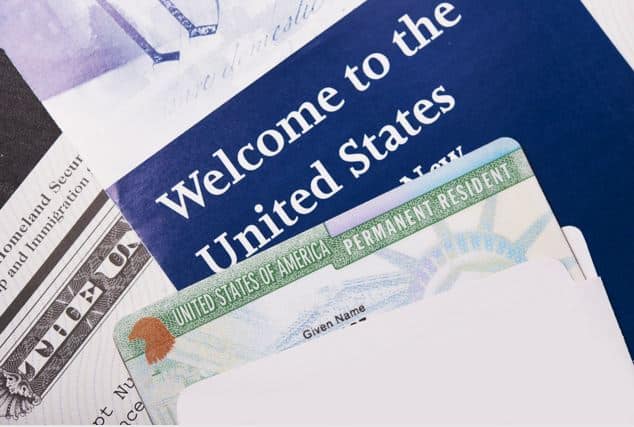Adjustment of Status and Advance Parole in 2025: What You Need to Know

By, Lauren Twist, Counsel
Filing for adjustment of status (applying for a green card) is a key step for many immigrants who want to stay in the U.S. permanently. Advance parole is a document that can let you travel abroad while your application is pending. But in 2025, both filing and travel come with risks that you should understand before acting.
Risks of Filing Adjustment of Status
Applying for a green card is not always simple. Here are some risks:
-
Past Immigration Issues Can Come Up
USCIS will review your full immigration history. Past overstays, working without permission, or other visa issues may be discovered. Talk to an immigration lawyer before filing. -
You Must Be Admissible
Certain issues—like criminal problems, security concerns, or fraud—can lead to a denial of your green card case. In some cases, a denial can trigger removal (deportation) proceedings. -
Risk of Removal Proceedings
Filing your green card application can put you on the government’s radar. If your case is denied, ICE may start removal proceedings. Even if your application is still pending, ICE may initiate removal proceedings in some cases if you do not have a valid immigration status. -
Delays and Policy Changes
USCIS has long processing times. Policies can also change quickly, which may affect your application.
FAQ: What happens if my adjustment is denied?
USCIS may issue a Notice to Appear (NTA), which starts
removal proceedings. This is more likely if the denial is due to
issues like fraud, criminal history, or being unlawfully present.
You should speak with an attorney to discuss next steps.
Risks of Traveling on Advance Parole
Advance parole lets you leave and return to the U.S. without abandoning your green card application. But it has risks:
-
Parole vs. Admission
Coming back on advance parole does not count as being “admitted” to the U.S. When you return to the United States, a CBP officer will decide whether to “parole” you into the United States, in which case you will remain an applicant for admission. -
Limited Bond Options
Current ICE guidance (July 2025) says parolees usually cannot ask an immigration judge for bond. DHS generally decides if and when you can be released from detention. -
Travel Delays
You must have your approved advance parole in hand before leaving. You may go through extra inspection at the border, which could take extra time and cause delays.
FAQ: Can I be denied re-entry with advance parole?
Yes. Importantly, advance parole does not guarantee that you will be paroled into the United States. The advance parole document provides the opportunity to return to the United States to seek parole, but CBP still decides if you can reenter the U.S. A CBP officer may be authorized to detain you and subject you to removal or removal proceedings if you have problematic issues in your immigration or personal history (e.g., criminal issues).
The H-1B and L-1 Exception: A Safer Option
If you have valid H-1B or L-1 status and a pending green card application, you can travel on your H-1B or L-1 visa instead of advance parole.
- You would be admitted in lawful nonimmigrant status, not paroled.
- You keep your visa status while your green card is pending.
- You avoid some risks parolees face, like detention or limited bond options.
FAQ: Should I travel on my visa or advance parole?
If you have H-1B or L-1 status, traveling on that visa is usually safer. People in other visa categories (like F-1 or O-1) must use advance parole. If you travel on an H-1B or L-1 visa, make sure your H or L status is valid before travel and you return to work for the same employer after re-entry.
Other Common Questions
Can I keep working while my green card is pending?
Yes, if you have valid H-1B or L-1 status, or you get a work permit (EAD). Working without authorization before approval can cause serious problems for your green card application and could potentially subject you to removal from the United States.
What’s the difference between “admitted” and “paroled”?
-
Admitted: A person is “admitted” when they
legally enter the U.S. with a visa (like H-1B or L-1) after
being inspected by a CBP officer at the border. Being admitted
is important because:
- They have more rights, including some constitutional protections, than someone who has not been admitted.
- They may qualify for certain immigration benefits that others cannot get.
- If the government tries to remove them, the laws that apply are usually more favorable than for someone who has not been admitted.
- Paroled: An individual is permitted to enter the U.S. temporarily but remains an applicant for admission, which is riskier.
Should I speak with an attorney?
Yes. Every case is different. A consultation can help you avoid risks like removal, inadmissibility issues, or detention
Key Takeaways
- Filing for adjustment of status can uncover past immigration issues and may trigger removal if denied.
- Traveling on advance parole in 2025 is riskier because parolees have limited protections at the border.
- H-1B and L-1 visa holders may have a safer travel option using their visas instead of advance parole.
Conclusion
Both filing for adjustment of status and traveling on advance parole carry risks that can have lasting consequences. Because every case depends on an individual’s immigration history, current status, and travel needs, there is no one-size-fits-all answer. If you are considering filing for adjustment or planning international travel, we invite you to contact our firm to arrange a consultation. A brief conversation can help you make informed decisions and avoid unintended complications.
Disclaimer: This article does not constitute legal advice and is for general education purposes only. Please consult an attorney directly for advice about your specific case.


